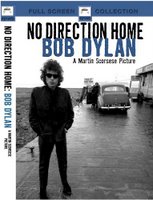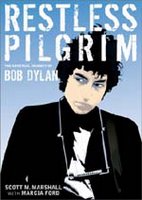
I’ve previously blogged about Bob Dylan’s autobiography (27 Aug) and I’ll have you know that my order of this sixties icon’s acclaimed documentary No Direction Home finally arrived.
Among the more memorable bits would be his press interviews where an unknown reporter asked him to “suck your spectacles” for a photo, the late Allen Ginsburg’s emotional recollection that radicalism’s torch had at last found a deserving new symbol in Dylan, the dishevelled singer’s performance of Only a Pawn in Their Game at Martin Luther King’s historic civil rights rally at Washington DC (where King delivered his “I have a dream” speech), and
Two weeks ago, Michelle loaned me Scott Marshall’s Restless Pilgrim:The Spiritual Journey of Bob Dylan. Well-researched and perceptively written, Scott Marshall is a true blue dylanophile whose detailed look at Dylan’s preoccupation with Christian and Jewish themes in his songs and public statements suggest that the singer’s preoccupation with Jesus was no passing fancy. Dylan’s faith may have found its richest expressions during his ‘born-again’ phase (Slow Train Coming 1979, Saved 1980, Shot of Love 1981) but it continues unabated according to the author.
In a 1980 interview, Dylan said:
Years ago they used ..., said I was a prophet. I used to say, "No, I'm not a prophet," they say, "Yes, you are, you're a prophet." I said, "No, it's not me." They used to say, "You sure are a prophet." They used to convince me I was a prophet. Now I come out and say Jesus Christ is the answer. They say, 'Bob Dylan's no prophet.' They just can't handle it."The book ends in 2002 and the author notes that Dylan has never failed to include more overtly Christian compositions in his public performances. Personally I am intrigued that he still performs lesser appreciated works such as In the Garden and I am the Man, Thomas (by Ralph Stanley and Larry Sparks) . During his European Tour in spring 2002 Dylan, Solid Rock was in the first set list:
Well, I'm hangin' on to a solid rock
Made before the foundation of the world
And I won't let go, and I can't let go, won't let go
And I can't let go, won't let go, and I can't let go no more.
For me He was chastised, for me He was hated,
For me he was rejected by a world that He created.
Nations are angry, cursed are some,
People are expecting a false peace to come.
Well, I'm hangin' on to a solid rock
Made before the foundation of the world
And I won't let go, and I can't let go, won't let go
And I can't let go, won't let go, and I can't let go no more.
Why should a man such as Dylan continue to do this if it did not mean something personally, asks
Related links:
Bob Dylan's BBC Season
Rutherford Institute Interview with Scott Marshall
Charlie's McCollum's review of No Direction Home

No comments:
Post a Comment